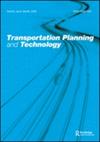产出不理想的货柜码头营运商的营运效率:以懒散为基础的措施
IF 1.8
4区 工程技术
Q3 TRANSPORTATION SCIENCE & TECHNOLOGY
引用次数: 0
摘要
摘要在集装箱码头行业中,运营效率对于降低成本、增加吞吐量、提高客户满意度、优化供应链、提高安全性、最小化环境影响以及确保在动态竞争市场中的适应性和弹性至关重要。本文的目的是在考虑二氧化碳排放和工作事故作为不良产出时,通过基于slacks的措施(SBM)模型估计cto的运营效率。为此,本文采用聚类分析选择同质cto作为决策单元(dmu)。然后对蔡梅- thi Vai港(CMTV案例)的cto进行实证研究,以验证所建议模型的有效性。研究结果可能对寻求提高运营效率和保持高质量增长的管理措施的首席技术官有实际应用价值。此外,研究模型可为相关港口管理应用提供分析参考。特别是,本研究为cto评估港口cto的运营效率提供了一个科学的框架。关键词:作业效率,基于漏洞的测量,集装箱码头,工作事故,空气排放,集装箱码头操作员,作者感谢同事们非常周到的审查和批评意见,这使得手稿的早期版本得到了重大改进。披露声明作者未报告潜在的利益冲突。本文章由计算机程序翻译,如有差异,请以英文原文为准。
Operational efficiency for container terminal operators with undesirable outputs: slacks-based measures
ABSTRACTOperational efficiency is crucial in the container terminal industry to reduce costs, increase throughput, enhance customer satisfaction, optimize the supply chain, improve safety, minimize environmental impact, and ensure adaptability and resilience in a dynamic and competitive market. The article aims to estimate operational efficiency for CTOs by the Slacks-Based Measures (SBM) model when considering CO2 emissions and work accidents as undesirable outputs. In doing so, this paper adopted the cluster analysis to select homogeneous CTOs acting as Decision-making Units (DMUs). CTOs in the Cai Mep-Thi Vai port (the CMTV case) were then empirically studied to verify the validity of the suggested model. The results could have real-world applications for CTOs looking for managerial actions to boost operational efficiency and maintain high-quality growth. Additionally, the research model may provide an analytical reference for relevant port management applications. In particular, this study offers CTOs a scientific framework for evaluating the operational efficiency of CTOs located in a port.KEYWORDS: Operational efficiencySlacks-Based Measurescontainer terminalswork accidentsair emissionscontainer terminal operators AcknowledgementsThe authors would like to thank colleagues for very thoughtful reviews and critical comments, which have led to significant improvements to the early versions of the manuscript.Disclosure statementNo potential conflict of interest was reported by the author(s).
求助全文
通过发布文献求助,成功后即可免费获取论文全文。
去求助
来源期刊

Transportation Planning and Technology
工程技术-运输科技
CiteScore
3.40
自引率
6.20%
发文量
24
审稿时长
12 months
期刊介绍:
Transportation Planning and Technology places considerable emphasis on the interface between transportation planning and technology, economics, land use planning and policy.
The Editor welcomes submissions covering, but not limited to, topics such as:
• transport demand
• land use forecasting
• economic evaluation and its relationship to policy in both developed and developing countries
• conventional and possibly unconventional future systems technology
• urban and interurban transport terminals and interchanges
• environmental aspects associated with transport (particularly those relating to climate change resilience and adaptation).
The journal also welcomes technical papers of a more narrow focus as well as in-depth state-of-the-art papers. State-of-the-art papers should address transport topics that have a strong empirical base and contain explanatory research results that fit well with the core aims and scope of the journal.
 求助内容:
求助内容: 应助结果提醒方式:
应助结果提醒方式:


